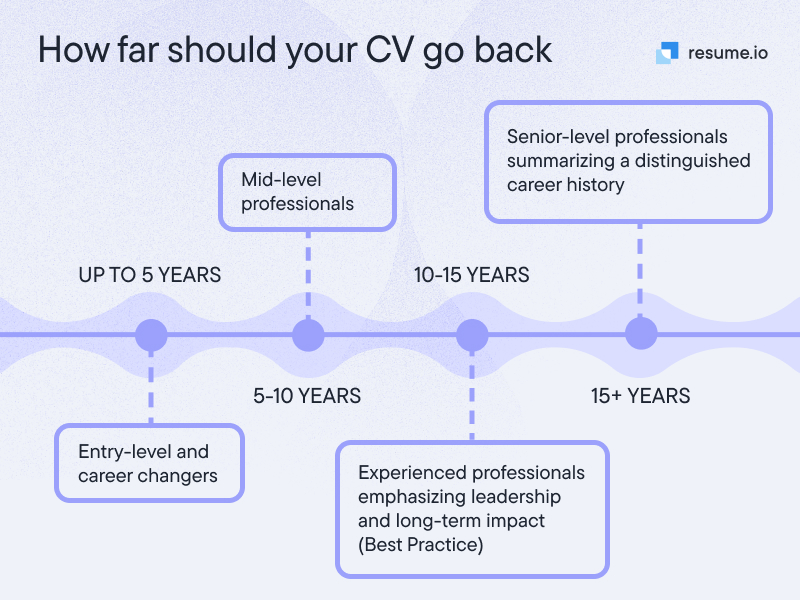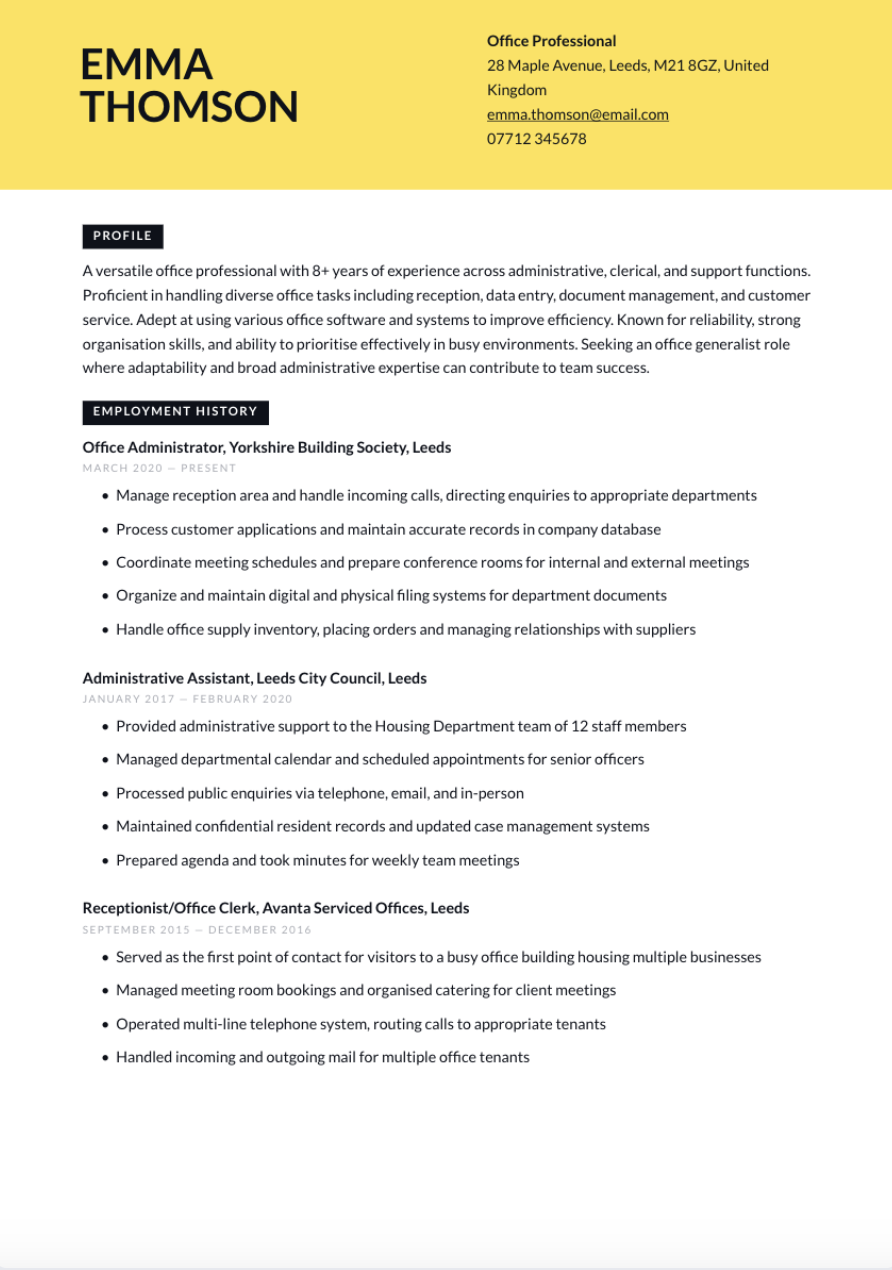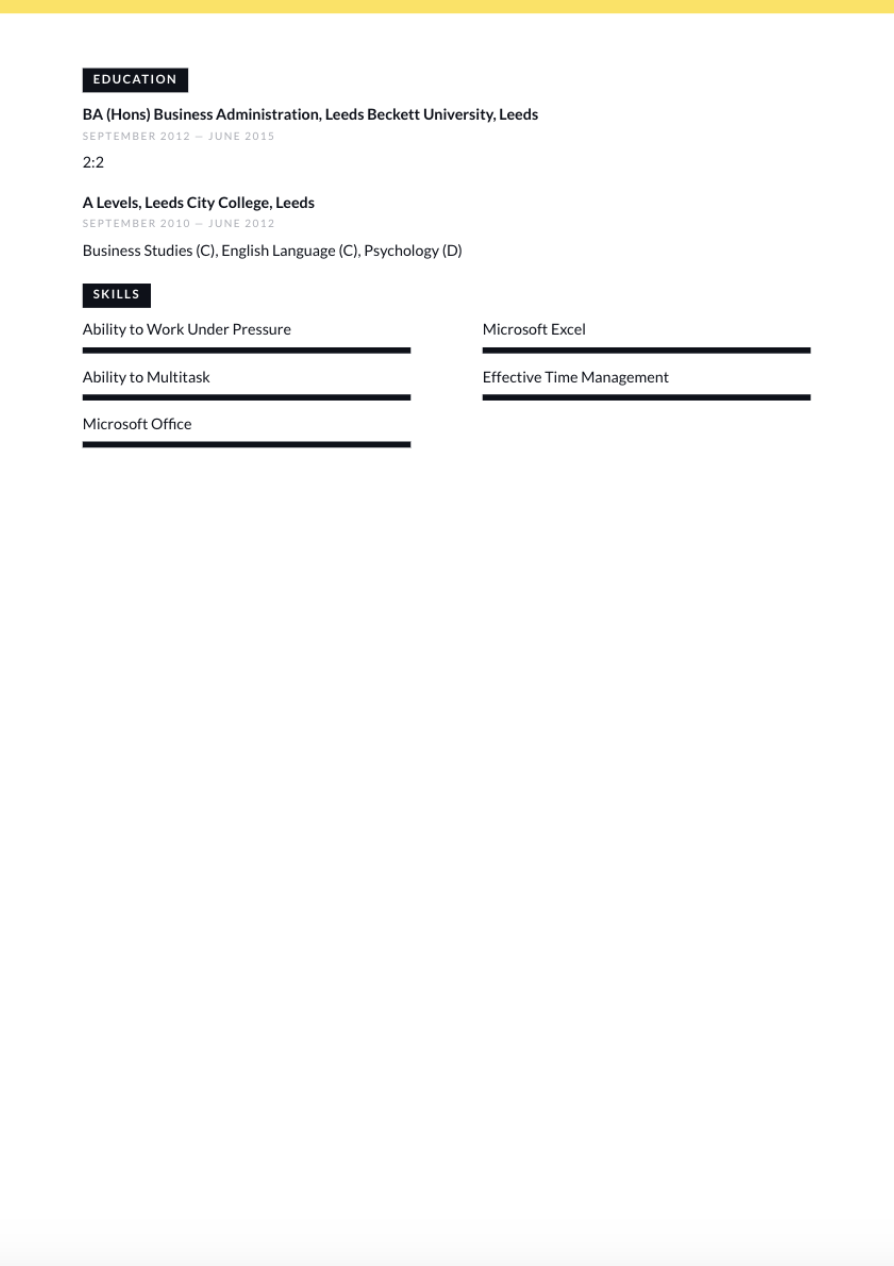
A CV is your personal marketing tool—a snapshot of your professional experience, education, and skills. With so much to include, it can be tempting to pack in every detail. But when it comes to CVs, less is often more. In the UK, employers typically prefer clear, concise documents that quickly highlight your value.
So, how long should a CV be in 2025? In this guide, we’ll break down the ideal length and why keeping your CV focused matters, plus tips on how to trim the excess without losing impact.
How many pages long should a CV be?
Should a CV be one page? Can a CV be two pages? Or even longer? Who should use each CV length and when?
To help you determine the ideal CV length for your situation and career stage, here’s a quick breakdown of UK best practices in 2025:
| CV LENGTH: | RECOMMENDED FOR: | EXAMPLE: |
| 1 Page | Entry-level & recent graduates | Marketing graduate with internship experience |
| 1-2 Pages | Mid-career professionals | Project manager with 5–10 years of experience |
| 2-3 Pages | Senior & executive roles | C-suite executive or academic researcher |
Most professionals will find that writing a CV in one to two pages strikes the perfect balance—highlighting valuable skills and achievements without overwhelming the reader. For entry-level and recent graduates, one page is usually enough to highlight your key strengths and potential. Senior roles or academic positions can extend beyond two pages, as long as the content remains relevant and well-structured.
CV length can also vary by industry. Creative roles in design or media often favour one-page CVs with links to portfolios, while corporate sectors like finance or law typically prefer a clear, two-page format. If you work in academia or a research role, your CV may exceed even three pages to include publications, projects, and teaching experience.
The best approach is to tailor your CV to reflect both your experience and your industry. Keep it concise, relevant, and easy to navigate—employers value quality over quantity. If you're unsure, two pages is usually a safe bet in most UK industries.
One-Page CV Template & Examples
Two-Page CV Template & Examples


What to include on your CV pages
While your CV should be concise, there are some key elements that should always be included.
Here’s a quick overview of the five essential sections:
- CV header. This includes key contact details, including your mobile number and professional email address.
- Personal profile. Give a brief overview of your key skills and experience (three to four sentences).
- Work experience. Describe your relevant employment history, including notable achievements.
- Education and qualifications. List your education to date, including degrees and certifications.
- Key skills. This includes both soft skills (such as communication, teamwork, and leadership) and hard skills (usually industry-specific) that are relevant to the role.
How to keep your CV concise without losing impact
Hiring managers are typically inundated with CVs. If yours looks like a novel, they can quickly lose interest. Employers value clarity and readability, often preferring to skim-read a CV on first review. For that reason, a concise CV will always generate better results.
Fitting everything into one or two pages can be difficult, but with a few adjustments, it’s achievable. If you find that your CV is veering toward an overly lengthy document, here are some effective ways to streamline without losing impact:
Eliminate outdated experience
With significant experience under your belt, it can be even trickier to keep your CV length succinct. Hiring managers are most interested in your recent and relevant experience, so there’s no need to go into detail about roles from more than 10 years ago.
If you'd still like to show that older experience, you can simply list the title, company name, and dates in one concise line each. That way, you make space for the parts of your career that are more recent and relevant right now.
Director, ABC Company, London (Sep 2009–July 2010)
Assistant Director, DEF Ltd, London (Aug 2000–Sep 2009)
Use bullet points for clarity
Bullet points are a great way to break up blocks of text, provide your CV with more structure, and highlight important information. This creates a more pleasant reading experience for the recruiter by allowing them to skim read and find the information they need quickly and easily.
Your work experience section is arguably the best place to use bullet points. You only need three to five bullet points under each job role, as there is no need to list every single responsibility.
Tailor these bullet points to suit the position you are applying for and keep them to the key facts, focusing more on notable achievements than merely listing duties. Use strong action verbs and quantifiable metrics to highlight the impact you had.
Sales Representative – Quickly Systems
Aug 2022 - Present
- Increased monthly sales revenue by 25% within six months by developing targeted client pitches and strengthening follow-up processes.
- Exceeded quarterly sales targets by 40% through strategic upselling and securing key accounts in a competitive market.
Focus on highest achievements
Your experience and education sections only need to state your highest, most relevant qualifications, even if you have completed earlier studies.
For example, once you’ve completed a university degree, you can remove your college or secondary school education from your CV. Besides freeing up valuable space on your CV, this will also ensure that your top accomplishments and degrees stand out.
Applying for your first job?
If you’re a student or graduate, or making a big career change, you may be struggling to fill a one-page CV due to a lack of relevant work experience. In this situation, it's best to provide more details on your transferable skills and expand on your education, including modules, projects, and work placements.
Check out our article on how to write a CV with no experience.
Common CV mistakes to avoid
Condensing your CV length means making clear, purposeful choices about what to include. Watch out for these frequent mistakes that can reduce CV readability and impact:
- Unnecessary details. Avoid including any irrelevant information such as hobbies, interests, or personal details that do not relate to your target role.
- Keyword stuffing. Filling your CV with too many industry terms can make it harder to read and may come across as unnatural. Use relevant language, but keep it clear.
- Vague wording. Phrases like “Responsible for various tasks” don’t convey much. Be specific about what you did and, where possible, include measurable results.
- Skipping key sections. While you want to keep your CV as succinct as possible, make sure that it still covers the five essential sections in a clean and organised layout.
- Avoid repetition. Every point on your CV should add fresh value and insight. As you review your CV, watch for duplication and remove anything that doesn't contribute new information.
When considering how long your CV should be, focus on including information that directly shows your suitability for the specific role—anything else is just taking up valuable space. Use our Use our CV maker and CV templates to help get you started.




